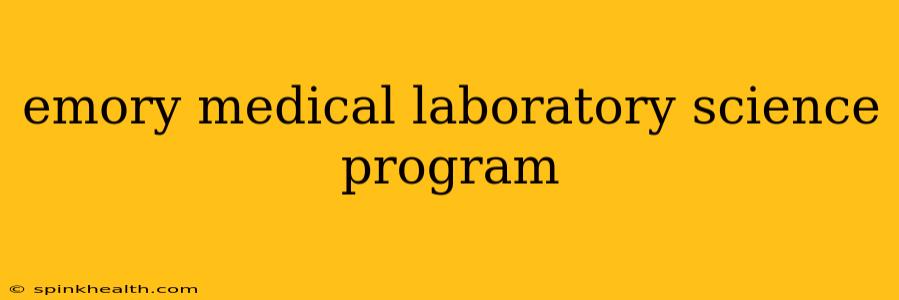Decoding the Emory Medical Laboratory Science Program: A Journey into the Heart of Diagnostics
The Emory University Medical Laboratory Science (MLS) program isn't just a degree; it's a launchpad into a critical field shaping healthcare. Imagine a world without accurate, timely diagnoses – a world where diseases go undetected, treatments delayed, and lives jeopardized. That's the world medical laboratory scientists prevent. This program at Emory, a renowned institution, trains the next generation of these unsung heroes, equipping them with the skills and knowledge to unravel the mysteries hidden within human biology. Let's delve into what makes this program so exceptional.
What makes the Emory MLS program stand out?
Emory's reputation precedes it. The program benefits immensely from the university's overall prestige, access to cutting-edge research facilities, and connections to a vast network of healthcare professionals. But it's more than just the Emory name; it's the hands-on training, the experienced faculty, and the rigorous curriculum that truly set it apart. Students aren't just passively absorbing information; they are actively participating in the diagnostic process, honing their skills in a state-of-the-art setting.
What is the curriculum like?
The Emory MLS curriculum is a carefully crafted blend of theoretical knowledge and practical application. Expect in-depth study of:
- Clinical Chemistry: Analyzing blood and other bodily fluids to detect imbalances and diagnose diseases.
- Hematology: Examining blood cells and their components to identify blood disorders.
- Microbiology: Identifying and characterizing microorganisms to guide infection control and treatment.
- Immunology and Serology: Understanding the body's immune response and using serological tests for diagnosis.
- Molecular Diagnostics: Utilizing advanced technologies like PCR to detect genetic mutations and infectious agents.
What are the admission requirements?
Gaining entry into Emory's competitive MLS program requires dedication and strong academic performance. While specific requirements may vary, expect to see:
- Strong GPA: A high GPA in relevant undergraduate coursework is paramount.
- Prerequisite Courses: Completion of specific science courses, including biology, chemistry, and mathematics, is usually mandatory.
- GRE Scores (sometimes): Depending on the year and program specifics, GRE scores may be required. Check the Emory website for the most up-to-date information.
- Letters of Recommendation: Strong recommendations from professors who can attest to your academic capabilities and work ethic are crucial.
What kind of job opportunities are available after graduation?
Graduates of the Emory MLS program are highly sought after. Job prospects are excellent, with opportunities in:
- Hospitals: Working in clinical laboratories performing a wide range of diagnostic tests.
- Reference Laboratories: Performing specialized tests and analyses for multiple healthcare facilities.
- Research Laboratories: Contributing to medical research and development.
- Public Health Laboratories: Protecting public health by conducting disease surveillance and monitoring.
What is the difference between an MLS program and other related programs?
While there are overlaps, an MLS program focuses specifically on the clinical aspects of laboratory science, providing hands-on training in performing diagnostic tests. Other related programs, such as biology or biochemistry, might have a more research-oriented focus. MLS programs emphasize direct patient care through diagnostic contribution.
How long does the Emory MLS program take to complete?
Typically, the Emory MLS program is a dedicated, focused program with a structured timeframe. Check the Emory website for the precise duration.
Is there a clinical rotation component to the Emory MLS program?
Yes, a significant part of the Emory MLS program involves hands-on clinical rotations in accredited medical laboratories. This provides invaluable real-world experience and allows students to apply their theoretical knowledge in a practical setting. This aspect is critical in preparing graduates for a successful career.
Emory University's Medical Laboratory Science program offers a path to a rewarding and impactful career. It's a testament to the vital role medical laboratory scientists play in modern healthcare, providing a rigorous and enriching educational experience for aspiring professionals. By combining academic excellence with practical experience, the program empowers graduates to make a significant contribution to the health and well-being of communities worldwide. Remember to visit the official Emory University website for the most current and detailed information.

